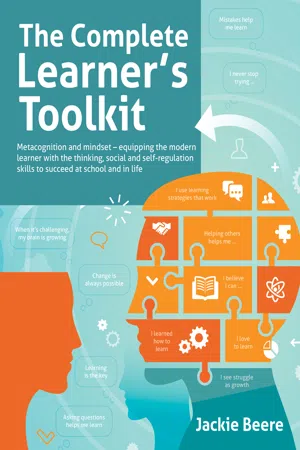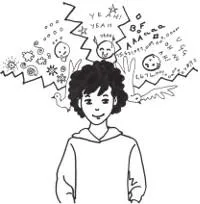
The Complete Learner's Toolkit
Metacognition, growth mindset and beyond - equipping the modern learner to succeed at school and in life
- 200 pages
- English
- ePUB (mobile friendly)
- Available on iOS & Android
The Complete Learner's Toolkit
Metacognition, growth mindset and beyond - equipping the modern learner to succeed at school and in life
About This Book
Written by Jackie Beere, The Complete Learner's Toolkit: Metacognition and mindset - equipping the modern learner with the thinking, social and self-regulation skills to succeed at school and in life will empower teachers to transform their pupils' learning.
Jackie Beere knows that schools have a much more important job to do than simply to prepare children for exams. In this book she hands busy teachers the tools they need to weave personal development into the curriculum in powerful and exciting ways.
The Complete Learner's Toolkit focuses on the most important skills identified by the World Economic Forum - including critical thinking, emotional intelligence and judgement and decision making - and presents 36 lessons that can either be used as stand-alone sessions or be incorporated into a topic or subject context. Furthermore, they can be employed in whole-class lessons or when working with individuals/small groups who need extra support to become more independent, confident learners.
Jackie has devised each lesson to develop the habits of reflection and metacognition in all learners, setting them up with the skills they will need in order to thrive and the emotional intelligence that will help them pursue a happy future.
To make the most of the material in this book and create the best outcomes for students, Jackie suggests teachers also treat these lessons as personal CPD. Doing so can help embed in teachers' day-to-day practice the skills and mindsets which this book promotes, and so model them for their students. Teachers can also consider how best to adapt the lessons in this book and how to incorporate the World Economic Forum essential skills within their subject specialisms.
Suitable for use with learners aged 7 to 16.
The lesson plans in this book are available as editable PDFs sold under an annual licence. For more details contact [email protected].
Parts of this book were previously published in The Learner's Toolkit, ISBN 978-184590070-0.
Frequently asked questions
Information

Your amazing brain

 | Aim: To get curious about how your brain works and its amazing power. |
Brain quiz – are these statements true or false?
- An adult brain has about 100 billion (100,000,000,000 or 100 thousand million) neurons (brain cells).
- Signals in your neurons can travel at the same speed as Formula 1 cars (roughly 100 metres per second or 360 kilometres per hour).
- Your neurons create and send more messages than all the phones in the entire world.
- You learn by making connections between neurons.
- Exercise can help you learn.
- An adult brain weighs about 1.3 kilograms (almost 3 pounds).
- Your brain uses up 20% of your energy.
- Learning makes your brain more powerful.
- Your brain is more complex and powerful than any computer ever built.
- Your brain still works when you are asleep.1

TASK
Three brains in one

 | Aim: To understand how brains work so that you can increase your ability to self-regulate. |

Table of contents
- Praise
- Title Page
- Dedication
- Foreword
- Acknowledgements
- Contents
- Introduction:: Why this book is essential for our children
- Part 1: Active learning and learning strategies
- Part 2: Complex problem solving
- Part 3: Critical thinking
- Part 4: Creativity
- Part 5: Leadership and social influence
- Part 6: Emotional intelligence
- Part 7: Judgement and decision making
- Part 8: Service orientation
- Part 9: Negotiation
- Part 10: Cognitive flexibility
- Useful terms
- Bibliography
- Copyright
- Advertisement